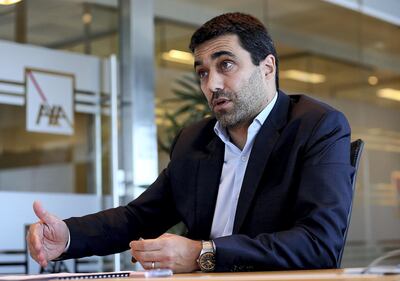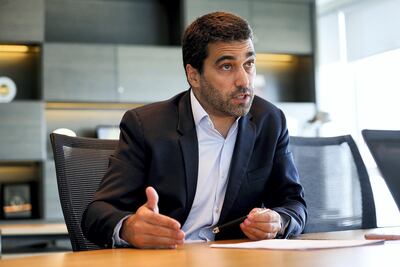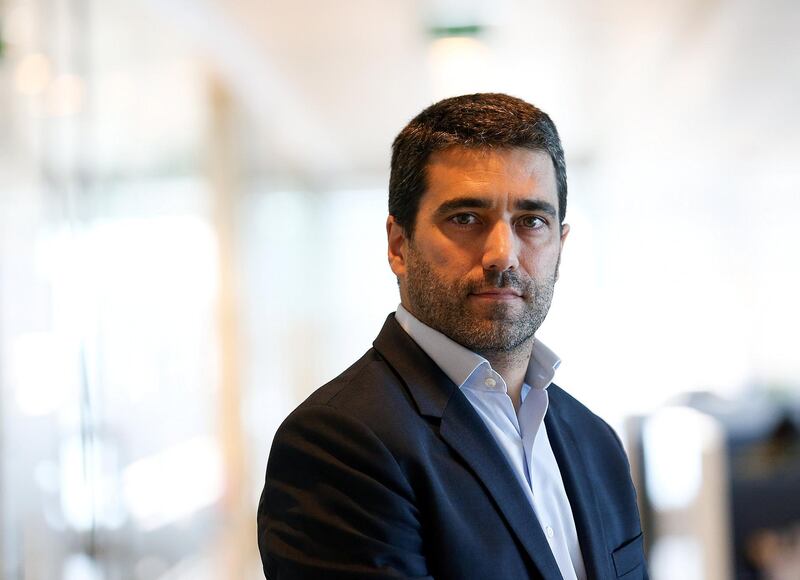Axa Gulf, one of the largest insurers in the GCC, is a one-stop shop offering health, car, home, travel, life and personal accident insurance — and even art, golf and yacht insurance.
But with many in the region tending to only buy insurance that is compulsory, namely health and car cover, other types of policies become a hard sell for insurers.
With low penetration rates compared to mature markets, this is something the French insurer wants to change, says Axa Gulf chief executive Cedric Charpentier.
“Insurance at this stage, even though growing in the awareness of people, remains quite at a low level,” Mr Charpentier says. “If we compare to mature markets, on life the penetration is approximately one-tenth of what it is in mature markets. And on property and casualty, it’s approximately half.”
Although Axa has been in the region for almost 70 years, Mr Charpentier thinks the time is ripe to increase market penetration through promotion of its existing products and potentially expanding into the contentious individual life savings space. He says the market has “huge potential” due to population growth in the medium to long term, expected GDP growth and growing awareness of different insurance products.
“People are understanding more and more the concept of protecting their business, protecting themselves and their families. That’s why we are very confident in the capacity of this region by itself to grow and … our capacity to increase our market share in the years to come,” says Mr Charpentier.
The GCC insurance market is projected to grow at a compound annual growth rate of 10.9 per cent from $26.2 billion (Dh96.2bn) in 2016 to $44bn in 2021, according to a December 2017 report on the GCC Insurance Industry by investment bank Alpen Capital. The UAE is expected to grow at the fastest annualised average pace of 12.1 per cent to $18.1bn in 2021.
The insurance market in the Emirates, quite crowded with 62 companies registered with the UAE Insurance Authority, is already experiencing rapid growth. Gross written premiums increased by 12 per cent to Dh44.8bn from 2016 to 2017, according to IA figures. Nearly Dh19.4bn of those premiums were in the healthcare sector, an increase of 13 per cent year-on-year.
Axa operates in the UAE, Oman, Bahrain and Qatar, and in Saudi Arabia as Axa Cooperative Insurance. It has more than one million customers in the GCC and had close to $1bn in gross written premiums in 2018. It experienced double-digit growth in the UAE in the first quarter year-on-year, according to Mr Charpentier.
About half of Axa Gulf’s income comes from healthcare insurance, a significant increase “in the last few years with the implementation of compulsory health insurance, notably in the UAE,” Mr Charpentier says. In the UAE, health care’s share to Axa’s income increased from 48 per cent in 2012 to 63 per cent last year.
Mandatory health insurance was first introduced in Abu Dhabi in 2006. In Dubai, compulsory coverage was implemented between 2014 and 2016. In the Northern Emirates, it is not yet mandatory for employers to provide medical insurance to employees.
However, Axa, like other regional insurers, is subject to complaints about high costs, poor coverage and limits like pre-existing conditions on health cover.
Pre-existing conditions are something “which we have to deal with” and offer the appropriate product based on the individual's situation, he says.
Mr Charpentier says Axa Gulf seeks to “move from being purely a payer of claims to becoming a partner of our customers”. Its “Health on Track” programme, for example, which started in 2015, includes services such as 24/7 teleconsultation through the Health on Track app.
While some individuals complain of having a harder time filing claims when not tied to a companywide insurance policy, Mr Charpentier says Axa does not “privilege one against the other”.
“This is something which we are constantly monitoring … A survey is sent automatically to each of our customers at key touch points with us and notably in the claims process itself,” says Mr Charpentier.
“We don’t want to hide behind insurance jargon, so we really try to make our products very simple,” adds Mr Charpentier. “It is our duty to make the price as competitive as we can. But I think more important than the price only is your understanding of what you’re buying and that you buy what you really need.”

The other half of Axa Gulf’s business is made up of 40 per cent property and casualty insurance — which includes car, home and travel — and 10 per cent life.
“On property and casualty, we have a significant portion that comes from motor insurance, which is once again the compulsory line,” says Mr Charpentier.
Axa Gulf is in the pilot phase for a “pay as you drive” product, whose price depends on the number of kilometres that you drive.
“It’s a concept which has been successful in other parts of the world,” says Mr Charpentier. “We know that, here in this region, some of us drive a lot and some others [very] few kilometres.”
Selling non-compulsory cover such as home and travel cover is more of a challenge. Only 11 per cent of consumers in the UAE are subscribed to a home insurance policy, according to a 2018 poll from price comparison website yallacompare.com. Around a quarter of the nearly 400 residents surveyed said they believe policies are too expensive, though average prices are Dh220 per year, while a similar number said there was no point in having it.
“Home insurance is not so obvious here in this part of the world. You are less exposed to natural catastrophes, less exposed to burglaries, for example, compared to many other markets,” says Mr Charpentier. “Unfortunately things can happen and we’ve seen a number of fires in this region, which when they happen and you’re not insured, you realise the benefit of it.”
Two fires damaged parts of Dubai Marina’s Torch Tower in 2015 and 2017, while a major fire in 2012 gutted the Tamweel Tower in Jumeirah Lakes Towers with many residents losing the entire contents of their homes.
Etisalat started offering a Home Protection Plan for eLife home customers in December at Dh10 per month, providing home contents coverage of up to Dh50,000.
Axa’s home insurance policy is significantly higher, starting at Dh1 a day, but includes wider coverage, including building, contents, worldwide personal belongings, owner and occupiers’ liability, and tenant’s liability. As part of its push to convince people to buy home insurance, Axa also includes benefits such as an emergency repair call-out service and alternative accommodation during home repair.

Travel insurance is another segment that is a hard sell. “You think you don’t need it — until you really need it and then you realise how important this could be,” says Mr Charpentier.
Coverage includes medical emergencies, baggage loss or damage, flight delays, last-minute cancellations and lost or stolen documents. Axa Gulf promotes its packages online and through partners, such as travel agencies, banks and airlines.
Axa also offers life insurance products in the GCC through a separate company, Axa Green Crescent, which was created in 2014. While Axa Green Crescent, where Mr Charpentier is a board member, offers individual life protection products, it does not yet offer life savings products.
Life savings products are undergoing an overhaul by the UAE Insurance Authority, following numerous complaints from customers mis-sold expensive and poor-performing policies. The new regulations will offer investors better protection by putting caps on commission paid to financial advisers and making fees more transparent. Mr Charpentier says Axa Green Crescent is in the process of working with the authority on draft regulations.
“We want to enter this market with extremely customer-centric products and think this will be supported by the new regulations that the insurance authority wants to implement,” says Mr Charpentier.









